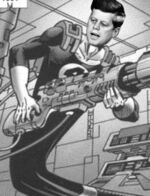Super-delegate
| Part of a series on |
| Politics of the United States |
|---|
 |
A super-delegate, in the American political system, is a delegate, especially to a national Presidential nominating convention, who is endowed with super-powers.
History
Although both the Democratic Party and the Republican Party like to go through the motions of soliciting voter input on who should be the Party's Presidential candidate, actual voters are, to put it mildly, morons. Frequently, the Party must contrive to both thank them for their valued contribution and hit the figurative Revert button.
The hoi polloi tirelessly coalesce around a candidate with inspiring new ideas, be it Bernie Sanders with his untested concept of socialism, or Ron Paul with his assertions that American tourism caused the Middle East to erupt until Jews had to dynamite the World Trade Center during the September 11 attacks. When such candidates gain traction, insiders (the "party-archy") need to turn away from the hoi polloi, consult with other polloi, and pick a candidate who is more electable, electability judged by persons who cannot persuade anyone of any actual idea.
- The Democratic Party, although it is built around the idea of democracy, understands that there is always such a thing as "too much of a good thing" (except high tax rates).
- The Republican Party teases activists who would like to return America to its erstwhile status as a Constitutional Republic, but understands that this must be balanced against the needs of Boeing, General Electric, and Lockheed, who are, after all, picking up the tab (and, bartender, make mine a double).
- The Libertarian Party has relative fidelity to both democracy and the Republic. However, liberty is obviously paramount, which means the Nominating Convention puts nominating a distant second, behind breast-baring and discharging firearms toward the chandeliers.
Both parties operate their Presidential Nominating Conventions under thick tomes of turgid rules, reformed every four years based on who feels he got screwed last time. The rules always provide that, sprinkled in among the elected delegates like antifreeze in the punch bowl are some number of super-delegates. For example, sitting governors, state party chairpersons, mayors of bankrupt cities, members of Congress, and other self-important worthies, get a free pass to the Convention floor. They are ex-officio delegates, a Latin expression based on the fact that most of them sign their names by making the letter X.
On reaching the Convention site, super-delegates use their super-powers to stage-manage the nomination and ensure that a centrist candidate, on whom the party-archy has the right amount of dirt, is nominated on time and on the first ballot. Super-delegates strive against evil:
- They hope to avoid the spontaneity that delayed George McGovern's acceptance speech until three in the morning, resulting in an audience even smaller than the current one.
- They hope to avoid excessive adherence to the Convention rules, which in theory would let the process take thirty-two ballots, meaning that the television networks would have to switch formats, from a "special" to the "mini-series," a version of Survivor with all the treachery and most of the pyrotechnics but none of the bikinis. This likewise would minimize the audience and thus the allure of commercial spots.
Specific super-powers
To pursue "truth, justice, and the American Way," as the voice-over man used to say before each Superman episode, the super-delegate has incredible powers:
- Infinite elasticity. The super-delegate can contort his body into any number of untenable and incompatible positions on public policy. He can sway with the most gentle of breezes. He can reinvent himself at will. His body is so elastic that he can appear to talk out of both sides of his mouth.
- Incredible strength. The super-delegate can "strong-arm" the elected delegates into doing things that go against the very reasons they were elected.
- Mind control is a related super-power. Elected delegates look at the super-delegate, in his Brooks Brothers suit and white wing-tip shoes, as a superior life form and not merely a more duplicitous one.
- Ability to "bend reality." In the wake of a groundswell to reject the political establishment that lets a rebel "win" a state, super-delegates emerge and declare themselves in favor of the best back-slapper, allowing the peasants with pitchforks to give each other high-fives for their victory while having no lasting effects on the selection process.
- Invisibility. As each tax increase produces less revenue than forecast and each new giveaway program attracts twice the "clients" as it was budgeted for, as entire American industries topple under the strain, one after the next, the super-delegate is nowhere to be seen.
Super-delegates gather at watering holes on Tuesdays, as the rest of the nation gathers at voting holes. Any of these gatherings is referred to as a Super Tuesday. Super-delegates may engage in macho sparring, childish dares, and scraping of hooves to determine which is the alpha-male. This was the basis for the Avengers movies. Super-delegates never avenge anything, such as the September 11 attacks, though many obsess with paybacks. Some super-delegates suffer from Jewish amnesia, which is when you forget everything but the grudges.
Brokered convention
Although super-delegates are powerful, their super-powers are not sufficient to actually pick a candidate at odds with the will of elected delegates. But what they can do is prevent the popular favorite from winning a majority vote.
At that point, arcane rules come out. When you vote for Ben Carson, God-help-us, what you get is a delegate who is likely to fly to the Convention city and who is "pledged" to vote for Carson. But only on the first ballot; not indeed for the rest of his natural life.
Once the first ballot is conducted and participation of super-delegates renders it inconclusive, the convention becomes "brokered." This means the party conducts a search for stockbrokers, who will sell the outcome to the highest bidder. It is child's play for party leaders to conclude that none of the candidates on the ballot in the states command majority support, and an entirely new Presidential nominee must be found whom no one has voted for.
Here again, the two Parties differ subtly in their procedure:
- The Republican Party will put forward someone for whom "it is his turn." (We can skip the "his or her" nicety.) This is typically the exact same nominee who went down in flames four years ago after waxing eloquent about what a fine gentleman the Democrat is and how he would make a fine President.
- The Democratic Party, whose candidates had been taking flak for months about having never managed a commercial enterprise larger than a lemonade stand, pick a ninety-year-old Congressman who has never managed anything but a filibuster.
See also
| Featured version: 25 June 2016 | |
| This article has been featured on the main page. — You can vote for or nominate your favourite articles at Uncyclopedia:VFH. | |



